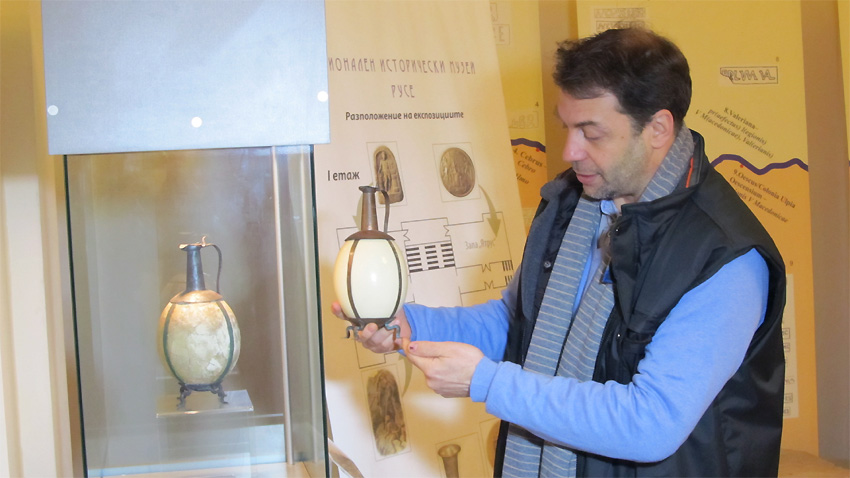Once upon a time or actually some 2500 years ago Thracians lived in the lands of present-day northeastern Bulgaria. One of the chiefs of the local tribes received a gift from distant lands. It was a beautiful pitcher to be used in ritual practices. The unique jug was made of ostrich egg. Unfortunately, the pitcher was broken in multiple pieces over time the Regional History Museum in Rousse received them as a donation. The museum staff realized the uniqueness of the donation half a year after it arrived.
“We knew this was some type of a vessel, museum director Associate Professor Dr. Nikolay Nenov says. “Only after the work of restorers finished we realized it was an extraordinary, magical object. It is abundantly clear that this is a ritual Thracian vessel dating back to the antiquity. At that time such a jug was just too exotic in our lands. We were wondering about the source of this Ostrich egg. We have also been looking for similar findings but there is no analogue discovered so far in the world. The British Museum has two ostrich eggs in its collection dating back to the VII-VI century BC. They are said to come from the east coast of the Mediterranean Sea - Phoenicia. Of course, we know about the ancient trade routes, coin circulation and manufacturers of certain products. Therefore, we can say that at that time the Getae Thracian tribe used to have trade relations with that part of the world. It is possible that the jug came to the lands of today’s Bulgaria in the 6th century BC.”
The museum director says that the expensive jug was probably used for containing wine during rituals.
 “Metal parts of the pitcher were made of bronze, very well preserved. Two of the legs needed to be made anew,” says Associate Prof. Nenov. The bronze left marks on the shell of the egg itself, which helped restoring the original shape. Currently the jug is in perfect condition.”
“Metal parts of the pitcher were made of bronze, very well preserved. Two of the legs needed to be made anew,” says Associate Prof. Nenov. The bronze left marks on the shell of the egg itself, which helped restoring the original shape. Currently the jug is in perfect condition.”
In the same way the jug was recovered from ostrich egg pieces the museum experts are looking for pieces of information in order to complete the story of the latest addition to the museum’s collection.
“Recently a lady came to our museum. She is a student in St. Petersburg and her lecturer works in the Hermitage. She also works there and according to her nothing similar can be seen. I hope that the experts there discover some information about a similar object as this is helpful to us”, Prof. Nenov concludes.
The museum has made a copy of the unique jug, also from an ostrich egg. It will be used during students’ classes held in the museum.
English version: Alexander Markov
Bulgarian Patriarch Daniil met with Ecumenical Patriarch Bartholomew in Thessaloniki, the Bulgarian Patriarchate announced. The two discussed the centuries-old spiritual ties between the Ecumenical Patriarchate of Constantinople and the Orthodox..
On September 22, 1908, Prince Ferdinand I proclaimed Bulgaria’s independence in a manifesto, formally establishing the Third Bulgarian Kingdom. The location was chosen with care: the Church of the Forty Martyrs in the old capital, Veliko Tarnovo,..
From 16 September, the History Museum in Panagyurishte will be hosting the original Panagyurishte Gold Treasure. The priceless find will be displayed in the museum’s secure vault hall, where it can be seen until October 23. The treasure will be on..
An intact grave of a young woman dating to the beginning of the 2nd century AD has been discovered by archaeologists near the village of Kapitan Petko..

+359 2 9336 661
